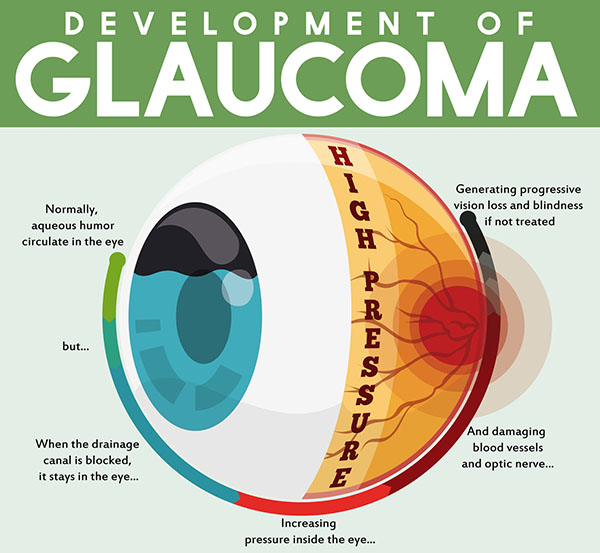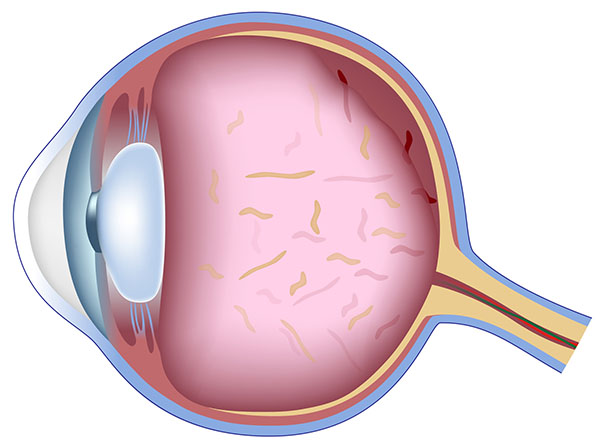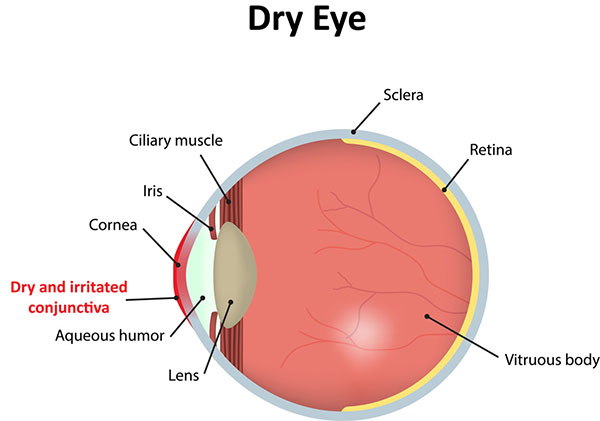Our Services
Our mission as your optometrist is to make sure when you leave this office you will be leaving knowing you had the best eye exam with doctors that truly care about you and your eyes.
Dr. Michael J. Pfeffer & Associates is your all-in-one local eye care solution for better vision and long-term eye health. With the most technologically advanced procedures at the disposal of our highly-skilled staff, you can rest easy knowing you’re getting the most complete vision care possible right here in Franklin!
Here are some common eye conditions we diagnose:
Glaucoma
Glaucoma is a condition that develops when fluid builds up in the front part of your eye. The extra fluid increases pressure in your eye, there are no warning signs or obvious symptoms in the early stages.
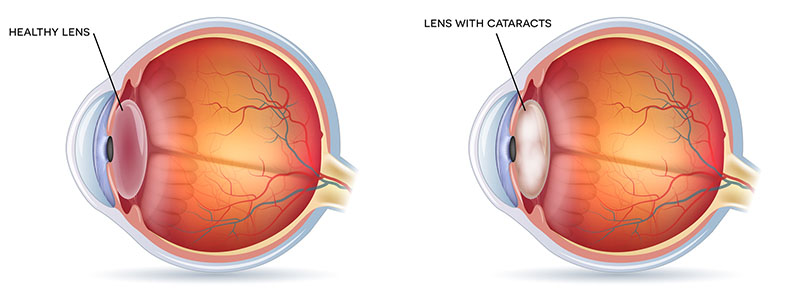
Cataracts
Cataracts occur when the lens in your eye becomes cloudy from natural proteins that build up over time. As the condition progresses, the clouded lens allows less light to pass through your eye and your vision becomes blurred.
Flashes and Floaters
Eye floaters are tiny, specks, lines or shapes that enter into your field of vision, appearing to float in front of the eye. Most of the time, eye floaters are not a sign of anything harmful, and simply looking up or down can move them out of your field of vision. However, if they are accompanied by eye flashes, it may be a sign of retinal detachment, a serious condition that can lead to severe vision loss. You should call the office as soon as this occurs.
As we age, our vitreous starts to thicken or shrink. Sometimes clumps or strands form in the vitreous. If the vitreous pulls away from the back of the eye, it is called posterior viterous detachment. You are more likely to get floaters if you:
- are nearsighted (you need glasses to see far away)
- have had surgery for cataracts
- have had inflammation (swelling) inside the eye
Retinal Tear
What is a Retinal Tear? The retina is the layer of specialized nerve tissue lining the back of the eye that allows you to see. The inside of the eye is filled with a gel-like substance called the vitreous. Retinal detachment can occur when the gel-like material (vitreous) leaks through a retinal hole or tear and collects underneath the retina.
Dry Eye
Dry eye is caused by immune system issues, too little moisture, or moisture that evaporates too quickly. Itchy eyes, or occular pruritus, on the other hand, have a whole other set of causes. Certain infections, like keratitis and conjunctivitis (pink eye), make the eyes itchy and crusty. Allergies are a common culprit as well. The immune system sometimes marks substances like mold, dust and pet dander as "dangerous;" when these substances come into contact with the eyes, the body produces histamine, which makes for itchy eyes. People with rosacea, a chronic red facial reash, may also develop ocular rosacea, which makes the eye itchy. Developing dry eyes, for any reason, may also make the eyes extremely itchy.
We are fully licensed and equipped to offer you and your family any of the following services:
Comprehensive Eye Exams
Ensure your continued eye health with comprehensive eye exams and take preventive measures to protect your vision. If you wear contact lenses or glasses, regular appointments should be made to adjust magnification, and even if you see fine without glasses or contacts, an annual exam is still advised to evaluate eye health.
Eye exams are an invaluable tool in maintaining healthy eyes and detecting and preventing diseases both in the eye and systemically. Some diseases progress very slowly and without symptoms. Early detection is your best treatment option. Each patient will be evaluated with a refraction,, slit lamp, intramuscular pressure and retinal exam.
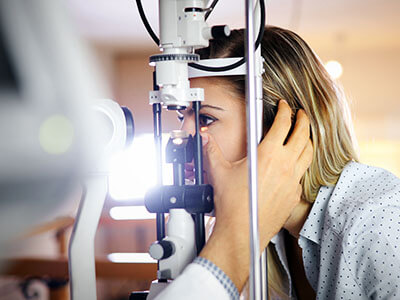
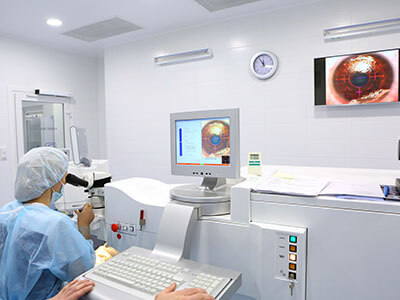
LASIK® Exams
Interested in laser-assisted eye surgery? Find out if LASIK® is right for you and see how easy it is to start seeing clearly without using contacts or glasses.
Contact Lens Exams & Contact Lens Fittings
Thanks to the advance of optical technology, almost everyone is a candidate for contact lens use. This includes patients with astigmatism and also those who prefer bifocal or multifocal lenses. The key to a successful contact lens fit is to have a doctor who has been trained in fitting contacts and who knows how to fit the correct lens to the correct patient. At Dr. Michael J. Pfeffer & Associates we have doctors who are very successful in fitting the correct contact lenses to their patients. We have a contact lens technician who is excellent at teaching the patient how to be a successful wearer. When the patient leaves with their contact lenses they feel confident because they have been taught how to handle their lenses properly.
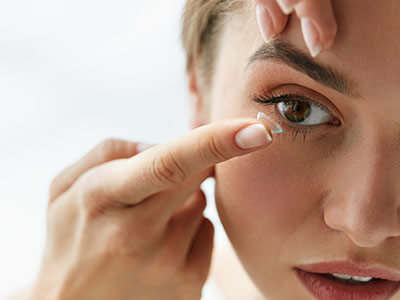
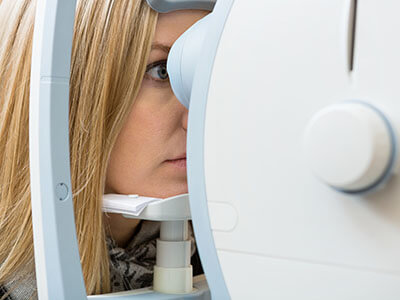
Digital Retinal Imaging
These color photographs can reveal abnormalities in your eye that may threaten normal vision. With regular digital retinal screenings, the doctor can detect even the slightest changes in your eye health to ensure you receive the earliest treatment possible.
Optical Coherence Tomography (OCT)
Optical Coherence Tonometry allows visualization of the internal structures of the eye including the cornea, iris, lens and retina. It enables the doctor to examine and measure the individual retinal layers to aid in the diagnosis and treatment of glaucoma, diabetic retinal disease, macular degeneration and many other retinal disorders.
Computerized Visual Field Testing
Why do people need a visual field test?
The visual field test can help the doctor find early signs of diseases like glaucoma that damage vision gradually. Some people with glaucoma do not notice any problems with their vision, but the visual field test shows that peripheral vision is being lost.
A visual field test can also help the doctor find out more about the part of the nervous system that allows us to see. The visual part of the nervous system includes the retina (the "film" in the camera-like eye), the optic nerve (the "wire" that carries images from the retina to the brain), and the brain itself. Problems with any part of this system can change the visual field. There are well-known patterns in the test results that help doctors recognize certain types of injury or disease. By repeating more visual field tests at regular intervals, doctors can also tell whether the patient is getting better or worse.
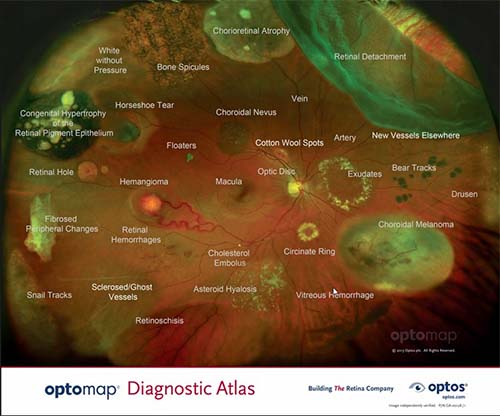
The optomap® Retinal Exam:
Your retina (located in the back of your eye) is the only place in the body where blood vessels can be seen directly. This means that in addition to eye conditions, signs of other diseases (for example, stroke, heart disease, hypertension, and diabetes) can also be seen in the retina. Early signs of these conditions can show on your retina long before you notice any changes to your vision or feel pain. While eye exams generally include a look at the front of the eye to evaluate health and prescription changes, a thorough screening of the retina is critical to verify that your eye is healthy.
Is fast, easy, and comfortable
May alleviate the need for dilation
Provides a permanent record for annual review
An optomap Exam gives us a panoramic image of the surface of your retina. These images help the doctor assess the health of your eyes and check for conditions including macular degeneration, glaucoma, and retinal detachments. These problems can threaten vision without warning or symptoms.
Serious health problems unrelated to the eye such as diabetes, hypertension, heart disease, some cancers,and auto-immune disorders, can also be viewed with an optomap Exam. Early detection could help save your vision or your life.
Call today for an appointment - 508-528-2040 or request an appointment below!

“Great care and the doctor even took the time to show my son how the machines and instruments all worked as this is a big interest to him.”
— Emily B.











Always check with your Insurance Company to make sure this office participates in your individual plan. We do not participate in all plans
Dr. Michael J. Pfeffer & Associates
480 West Central St.
Franklin, MA 02038
Click For Directions >
Contact Us
508-528-8644 (fax)
office@morrilloptometry.com
Hours of Operation
Mon-Thurs 8:00am-7:00 pm
Friday 8:00am-4:30pm
Hours may change under certain circumstances

